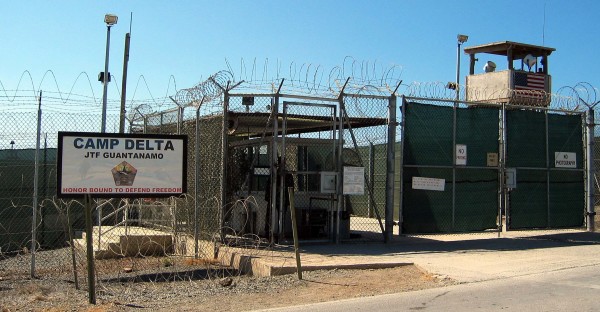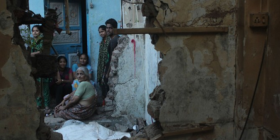Most of the men imprisoned at Guantanamo Bay prison’s Camp 6 have been on hunger strike for nearly three weeks, according to their attorneys. In response to reports, the Center for Constitutional Rights (CCR) and habeas counsel have sent a letter to military officials take measures immediately to improve the situation.
The letter notes, “Since approximately February 6, 2013, camp authorities have been confiscating detainees’ personal items, including blankets, sheets, towels, mats, razors, toothbrushes, books, family photos, religious CDs, and letters, including legal mail; and restricting their exercise, seemingly without provocation or cause.” Additionally, “Arabic interpreters employed by the prison have been searching the men’s Qur’ans in ways that constitute desecration according to their religious beliefs, and that guards have been disrespectful during prayer times.”
“These actions, and the fact that they have affected so many men, indicate a significant departure from the way in which the rules have been formulated and implemented over the past few years,” the letter declares.
It further reports:
“…As a result of these practices, we understand that the men are suffering greatly and that a large number have gone on a hunger strike, which is now in its third week. As their health has deteriorated, we have received reports of men coughing up blood, being hospitalized, losing consciousness, becoming weak and fatigued, and being moved to Camp V for observation. Detainees have also expressed feeling increased stress, fear, and despair. It is clear that their health will only worsen unless and until the hunger strike ends, which requires taking immediate steps to address the reasons for their protest…”
The letter mentions, “Prior instances of mistreatment, including mistreatment of the Qu’ran, have led to protests, including widespread hunger strikes that have placed the prisoners’ lives and health in jeopardy.” This conduct by the guards has affected lawyers’ “access” to clients and their ”ability to effectively represent them, since the hunger strike has already prevented some of them from taking our calls, meeting with us, and being able to participate fully when we are able to speak with them about their cases.”
Hunger strikes have often been the only way that prisoners have been able to force the US military to improve their confinement conditions or end mistreatment.
Omar Deghayes, a former Guantanamo prisoner who was part of the most publicized strikes at the prison when he was still being held, stated:
“We got used to hearing that our brothers in Guantanamo are on hunger strike; it became almost normal to the rest of the world but it’s not, especially for Muslim prisoners. I’ve been on hunger strike myself: you feel so much pain, your weight drops dramatically, people fall unconscious… The reason why all these men put themselves under so much difficulties is that depriving their body from food is the only means they have to ask for justice. [emphasis added] “
Detainees first began to engage in hunger strikes in 2002. The hunger strikes had a definite impact. The strikes from 2002 to 2005 effectively changed the dynamics in the prison. Former detainee Binyam Mohamed said there was no law and a colonel was saying, “’I do what I like’ but after the hunger strike – the big hunger strike of 2005 – they actually started implementing some kind of law that we knew about.” But, come 2006, the prison began to force feed detainees that were striking and force tubes down detainees’ throats in a manner that successfully convinced many of the detainees to end their resistance.
In March 2011, Jason Leopold of Truthout reported detainees continued to participate in hunger strikes with the hope that the conditions of their detention would improve or so they would no longer have their basic due process rights violated.
The tenth anniversary of the opening of the prison in January 2012 reportedly saw prisoners mark the anniversary by engaging in three days of protest that included hunger striking.
H. Candace Gorman, who represents two prisoners at Guantanamo, reported:
“The military claims it is searching for notes that it believes are being passed in the Quran. According to reports from some of the men this caused a large riot in the “Gulf” block in February and now all of the men except a few with medical problems are on a hunger strike that is now in its 4th week. Keeping with its policy of secrecy the military has denied there was a riot and refuses to acknowledge that the hunger strike involves nearly all of the men at the base- while at the same time the men are getting weaker and being moved to the hospital. “
Apparently, the protests and hunger striking would all come to an end if the following occurred:
“1. The right to voluntarily surrender the Quran under these conditions- the men would rather surrender their Quran’s than to be a party to the desecration by keeping it. (That will end the strike immediately);
2. Provide the Quran on an Ereader (this would ensure there are no notes being passed in the Quran and will allow the men to have the Quran without fear of it being desecrated).”
When considering the fact that 166 prisoners remain in confinement and 86 of them have been cleared for release by a review task force authorized by President Barack Obama, it would seem fulfilling these two demands would be the least the military or government could do.
Eighty-six people have been deemed to be completely innocent yet the Obama administration has not released these men. Obama has been a political coward and bowed to Republican hysteria around the prison or he himself has undergone a transformation where he now finds it acceptable to continue to hold innocent human beings indefinitely in detention. On January 28, he allowed the State Department office working to resettle detainees to close. Also, in January, he (again) signed a National Defense Authorization Act (NDAA) bill that made it next to impossible to close the prison.
There are a number of Yemeni prisoners who have not been cleared for release or who are cleared but will no longer be resettled because the “security situation” has deteriorated in Yemen. The responsibility for this, to some degree, lies with the Obama administration, which has been launching cruise missiles and drone attacks in an effort to target and kill suspected al Qaeda militants. This, according to Gregory Johnsen, has resulted in Al Qaeda in the Arabian Peninsula (AQAP) growing from “200-300 fighters in 2009, when the US bombing campaign began, to more than 1,000 fighters.”
Prisoners are being kept in detention indefinitely without charge or trial because the Obama administration has bought into the idea that the release of these men will get in the way of the permanent War on Terrorism being waged. The reality for these men is they can either engage in resistance through hunger striking or they can accept the inhumanity of their conditions.
Unfortunately, the prisoners of Guantanamo stand up for dignity and human rights at great risk to themselves. Any prisoner could die in prison like Yemeni prisoner Adnan Latif did on September 8, 2012. Latif went on a hunger strike. He was put in solitary confinement. He warned, “If they feel you are about to die, they take you to a solitary cell in Camp One that is designed for torture and you can’t imagine. Some have been on a hunger strike for one year and a half. They force feed them. My wish is to die. We are living in a dying situation.”
The Department of Defense recommended Latif be released in 2006, 2008 and 2009. According to an op-doc by Laura Poitras, US District Court Judge Henry Kennedy Jr. ordered his release in 2010 over lack of evidence. But, the DC Circuit Court of Appeals ruled the government’s intelligence reports were enough to keep him in detention. He died suspiciously. The military ruled his death a “suicide.”




Leave a reply